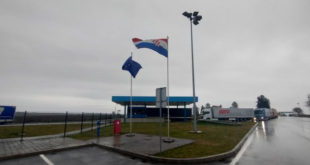Slovenian Foreign Minister Samuel Zbogar will meet today with his Croatian counterpart Goran Jandrokovic, some two weeks before Slovenians head to the polls to vote on a referendum on an arbitration agreement to settle a border dispute between the two countries.
The foreign ministers are set to meet on both sides of the border separating their countries, with a visit to a manufacturing site in the Slovenian town of Metlika. The two will hold a working lunch in the Croatian town of Karlovac.
They are expected to discuss bilateral issues, including customs concerns, in particular regarding goods being transported by truck from the Polir company in Croatian to the Kolpa company in Slovenia. They will also address the status of Croatia’s EU accession talks.
The meeting comes two weeks before Slovenia is set to hold a referendum on an arbitration agreement with Croatia to resolve the countries’ contentious border issue, which last year threatened to stall Croatia’s EU bid.
The Slovenian parliament voted to hold the referendum after ratifying the agreement in April. Slovenia’s top court cleared the deal in March as in line with the constitution. Croatia’s parliament has already ratified the agreement.
The accord to settle the 18-year-old border dispute was signed by Croatian Prime Minister Jadranka Kosor and her Slovenian counterpart Pahor in September last year, ending a 10-month stalemate and allowing Croatia to move forward with its EU accession talks.
Under the agreement, an international arbitration team will settle the dispute and its ruling will be binding for both countries.
The two countries have been at loggerheads over their maritime border in Piran Bay, and over small terrestrial border disputes, since the breakup of Yugoslavia in 1991.
Slovenia had claimed that the dispute was preventing its shipping from gaining free access to the Adriatic.
 Eurasia Press & News
Eurasia Press & News


